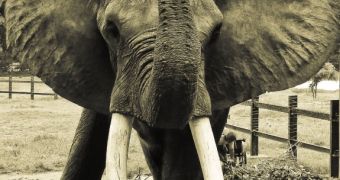A recent scientific study has shown that adult female elephants living in captivity die at a much younger age than their “peers” living in the wild, in natural reservations or on their own. The find was announced by a team of international scientists, who studied well over half of the world's captive elephant population, and a grand total of approximately 4,500 individuals in various regions of the globe. Their conclusion was that zoo life is inevitably deadly for elephants, even if in some cases, they are given the best possible care.
The team noticed that stress and obesity are the two most often-encountered causes of death, alongside illnesses. They say that being confined in such a small space, regardless of how big it may seem by some standards, harms the large animals, which need a lot of space to roam freely. Also, because they are very social and intelligent animals, they need to travel in packs, and living in pairs can be very damaging for them, in that they can actually become sad and lose their interest in life, much like humans.
"In zoos, the welfare of African elephants (Loxodonta africana) and Asian elephants (Elephas maximus) has long caused concern. Infanticide, Herpes, tuberculosis, lameness, infertility, and stereotypic behavior are prevalent, and zoo elephant populations are not self-sustaining without importation. Neither infant nor juvenile mortality differed between populations, but adult females died earlier in zoos than in Amboseli," says Ros Clubb of Britain's Royal Society for the Prevention of Cruelty to Animals, who, with his colleagues, published their study in the journal Science.
In Kenya's Amboseli National Park, the team found that adult female elephants lived to an average of 56 years of age, which is more than 3 times as long as their captive sisters. This percentage also applied in zoos where the managers offered the animals the most appropriate conditions. Clubb says that the very fact that they are captive is the main reason why elephants die at such an early age, as routine eventually gets the best of them.
These results raise new ethical questions as to how to deal with the last individuals of these endangered species, which are now protected throughout the world. Poaching is still a serious phenomenon, and many elephants fall victim to hunters looking for their ivory tusks each year.

 14 DAY TRIAL //
14 DAY TRIAL //